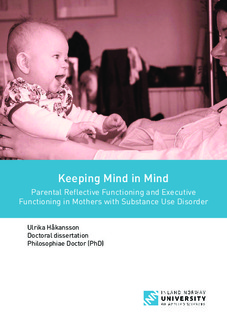| dc.description.abstract | There is a consensus that having a substance use disorder may adversely affect caregiving capacities. Parental reflective functioning (PRF) and executive functioning (EF) are both important capacities for sensitive parenting as well as often being impaired in SUD mothers. Although there are increasing interest in cognitive components underlying mentalizing capacities, no studies have previously investigated associations between PRF and EF in SUD mothers. Therefore, the first aim of this study (Paper I) was to investigate if PRF was associated with EF. We controlled for mental health status and IQ, factors known to associate with both PRF and EF. Our findings supported an association between PRF and EF, but the significant association was diminished after introducing mental health status as a control variable. However, when the group of mothers were divided in two based on PRF level, mothers with adequate PRF exhibited significantly better working memory, cognitive flexibility and planning capacities compared to mothers with poor PRF, even after controlling for mental health status and intelligence (IQ). In addition, mothers with poor PRF started using substances and developed a dependency significantly earlier than mothers with adequate PRF. These findings elucidate the association between particular EF components and PRF in mothers with SUD.
Compromised EF and PRF are both known to be associated with heightened stress levels. Mothers with SUD exhibit high levels of stress, as well as difficulties in stress-regulation. The second aim of the study (Paper II) was therefore to investigate how EF components (working memory, inhibition and cognitive flexibility) associated with different forms of stress (parental stress, general life stress and psychological distress), and if PRF mediated the association between EF and stress. Results demonstrated that cognitive flexibility significantly contributed to variance in parental stress, while working memory contributed to variance in psychological distress. PRF mediated the relationship between EF and parental stress, while the association between EF and psychological distress was partially mediated by PRF. As far as we know, this study is the first to demonstrate the mediating effect of PRF between EF and experience of stress. The result indicate that a well-functioning PRF and reflection around the experience of stress might heighten access to EF in SUD mothers.
Dysregulated levels of stress in adulthood have been associated with experiences of adversity in childhood. Adaptive childhood experiences, on the other hand, are known to enhance resilience. Mothers with SUD have a heightened likelihood of having experienced different types of adversity during childhood and adolescence, and often report low levels of adaptive childhood experiences. The third aim of this study (Paper III) was therefore to explore how different types of adversity (emotional, physical and sexual abuse and neglect) and adaptive experiences (safety and competence) in different developmental phases (early childhood, latency and adolescence) were associated with PRF, when we controlled for mental health status and EF. Results showed that only adaptive experiences in early childhood significantly explained variance in PRF. Mental health status also contributed to variance in PRF, indicating that mothers with more adaptive experiences in early childhood had better mental health status in adulthood, which in combination related to higher PRF. Mothers who reported absence of substantial adaptive experiences in early childhood exhibited lower PRF. Amongst the types of adversities, experiences of emotional abuse during childhood and adolescence stood out as contributing to deficits in PRF more than other types of adversities. In addition, EF contributed significantly to variance in PRF. The results indicated that mothers with less experience of emotional abuse had better EF, which in combination related to higher PRF. Moreover, compared to mothers with negative to low PRF, mothers with adequate PRF had more adaptive and less adverse experiences in the different developmental phases assessed. Our results indicate that PRF might have developmental trajectories. The results in this study may give further knowledge about possible intergenerational risk and resilience.
Findings in these studies indicate that development of effective interventions for mothers with SUD should have a dual focus on PRF and EF when targeting stress, dynamic intergenerational risk factors, and sensitive caregiving capacities. The considerable heterogeneity in the group of mothers stresses the importance of individually adjusted interventions in accordance with capacities and vulnerabilities to better target capacities important for sensitive caregiving | nb_NO |
